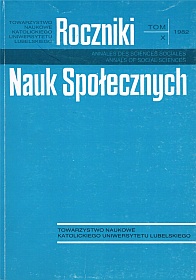Od racjonalności do racjonalizacji: Max Weber a socjologia dzisiaj
Abstrakt
The sociological theory of action has split into two streams the sources of which could be traced back to work of M. Weber. On one hand his ideas have been adopted by functionalism, especially in writings of T. Parsons, on the other hand by phenomenologists (A. Schütz) and subsequently by various branches of interactionism subsumed under the term interpretive sociology. To see the differences between them we have decided to concentrate on one, basic, idea of Weber’s – the rationality of action.
We have traced it back to the comparative studies of sociology on religion, the result of which pointed to the unique role and place of rationality in western, Christian culture. Rationalization of action has contributed to the specific changes in social structure, economic activity, but also unexpectedly contributed to emergence of diverse spheres of meaning, antinomies of values and the ensuing problems of coping with it.
Closer look at the weberian concept and criteria of rationality has revealed its inner inconsistencies. The analysis seems to warrant distinguishing three spheres of rationalization: economic and political activity (Zweckrationalität), ideal, moral values (Wertrationalität), and the sphere of cultural products with its formal-technical rationality. All those types could be crossected by the differentiation of means and ends of activity, thus providing a typology of rational action. However, this typology rests on the assumption of an ideal standard of rationality (more of a methodological type) being incorporated in the process of constructing action. This is the point where interpretive approach reveals its inherent weaknesses.
It is shown that rationality is not only a standard against which sociologist matches observed activities but also a constant endeavour on the part of those involved in the activity to render it accountable, that is to acquire meaning in interaction. Action becomes defined retrospectively by carving out sections of the constant flow of activity and binding them with inner experiences (motives), it is subject to redefinition in the light of new experiences. Thus we talk of rationalization as a series of practical undertakings, the result of which is structuration of interaction, rendering it intelligible. Those practices are guided by commonsense knowledge only part of which is available discursively. Social rules, apart from the sanctioning aspect, serve also as interpretive guidlines for identifying ocurrences of „same kind”. The task of sociological investigation is to analyze those practices, interpretive rules and common knowledge. Those elements are a common resource for those involved in interaction and the observer. For this reason sociological theory can be viewed as rationalization of second order, which poses new methodological problems.
Rationalization is a means of „producing” interaction and at the same time its outcome, depending on the changing context. This approach may help to clarify the relation between outcomes of normative and interpretive sociological analyses.
Copyright (c) 1982 Roczniki Nauk Społecznych

Utwór dostępny jest na licencji Creative Commons Uznanie autorstwa – Użycie niekomercyjne – Bez utworów zależnych 4.0 Międzynarodowe.


